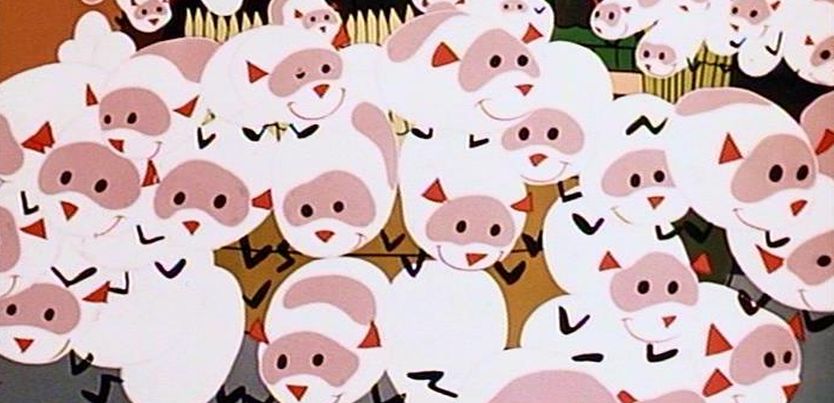 This humorous story by Ellis Parker Butler illustrates how excessive bureaucracy can have dire consequences. A customer argues with a railway freight agent who claims that two guinea pigs he has been sent should be charged as common pigs (sixty cents) rather than pets (fifty cents). The customer leaves the pigs with the agent, planning to collect them after complaining to the freight company’s Head Office. By the time the matter is settled in the customer’s favour, the ten-cent dispute has almost brought the company to its knees. Themes include misinterpretation, stubbornness, bureaucracy gone awry. More…
This humorous story by Ellis Parker Butler illustrates how excessive bureaucracy can have dire consequences. A customer argues with a railway freight agent who claims that two guinea pigs he has been sent should be charged as common pigs (sixty cents) rather than pets (fifty cents). The customer leaves the pigs with the agent, planning to collect them after complaining to the freight company’s Head Office. By the time the matter is settled in the customer’s favour, the ten-cent dispute has almost brought the company to its knees. Themes include misinterpretation, stubbornness, bureaucracy gone awry. More…
Category Archives: Grade 5-6 Stories
The Prince Who Wasn’t Hungry
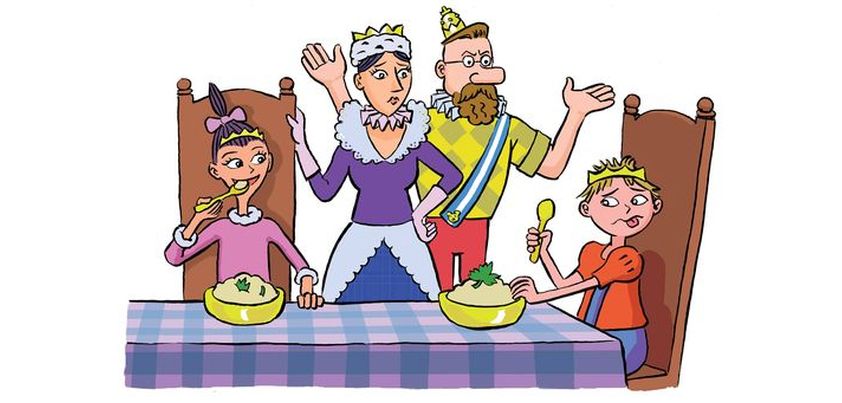 The message of this story by Carolyn Sherwin Bailey can be found in the very first line: Once upon a time there was a little Prince who had very little to do, and so he thought a great deal about eating. As he grew up, the whole palace had to work hard to meet his demand for increasingly rare dishes. Nothing satisfied him, and eventually he stopped eating. In frustration, he set out alone one day to find the best food in the world. He discovered that it isn’t the food that counts, but what you do to earn it. More…
The message of this story by Carolyn Sherwin Bailey can be found in the very first line: Once upon a time there was a little Prince who had very little to do, and so he thought a great deal about eating. As he grew up, the whole palace had to work hard to meet his demand for increasingly rare dishes. Nothing satisfied him, and eventually he stopped eating. In frustration, he set out alone one day to find the best food in the world. He discovered that it isn’t the food that counts, but what you do to earn it. More…
The Sand Castle
 The major theme of this story by Alma Luz Villanueva is climate change. Set over fifty years into the future, Earth has warmed so much that all birds and marine life are extinct and direct exposure to sunlight or seawater can be deadly. Although protective clothing must be worn when venturing outside during the day, an aging woman takes her grandchildren on monthly excursions to the beach. This time she has prepared a special treat. Spurred on by her own childhood memories, they are going to build their first sand castle. Other themes: memories, family, childhood wonder and imagination, hope. More…
The major theme of this story by Alma Luz Villanueva is climate change. Set over fifty years into the future, Earth has warmed so much that all birds and marine life are extinct and direct exposure to sunlight or seawater can be deadly. Although protective clothing must be worn when venturing outside during the day, an aging woman takes her grandchildren on monthly excursions to the beach. This time she has prepared a special treat. Spurred on by her own childhood memories, they are going to build their first sand castle. Other themes: memories, family, childhood wonder and imagination, hope. More…
The Emperor’s New Clothes
 The main theme of this famous children’s story from Hans Christian Andersen is, of course, vanity. Other themes include deceit, gullibility, honesty (fear of speaking up) and pride. The Emperor who puts appearance before the well-being of his people, and his courtiers who sense that something is amiss but don’t have the courage to report it, carry two important messages. We shouldn’t judge people by the clothes they wear, what brand of phone they carry etc., and children should be encouraged to speak up if safe to do so when they see something that is wrong. More…
The main theme of this famous children’s story from Hans Christian Andersen is, of course, vanity. Other themes include deceit, gullibility, honesty (fear of speaking up) and pride. The Emperor who puts appearance before the well-being of his people, and his courtiers who sense that something is amiss but don’t have the courage to report it, carry two important messages. We shouldn’t judge people by the clothes they wear, what brand of phone they carry etc., and children should be encouraged to speak up if safe to do so when they see something that is wrong. More…
Tuesday of the Other June
 Bullying exists all over the world, and can surface in almost any situation where people gather (school, the playground, work, sport etc.) This story from Norma Fox Mazer addresses the difficult question of whether the best approach for the victim is passive acceptance, assertiveness (standing up for oneself), or fighting back. Here, a mother’s advice is to turn the other cheek, smile at the world, and the world’ll surely smile back, while her daughter dreams of kicking, punching, and biting her (the bully) like a dog. Themes: mother-daughter relationships, bullying, fear, the courage to say “Enough!” More…
Bullying exists all over the world, and can surface in almost any situation where people gather (school, the playground, work, sport etc.) This story from Norma Fox Mazer addresses the difficult question of whether the best approach for the victim is passive acceptance, assertiveness (standing up for oneself), or fighting back. Here, a mother’s advice is to turn the other cheek, smile at the world, and the world’ll surely smile back, while her daughter dreams of kicking, punching, and biting her (the bully) like a dog. Themes: mother-daughter relationships, bullying, fear, the courage to say “Enough!” More…
Big Brother / Bade Bhai Sahab
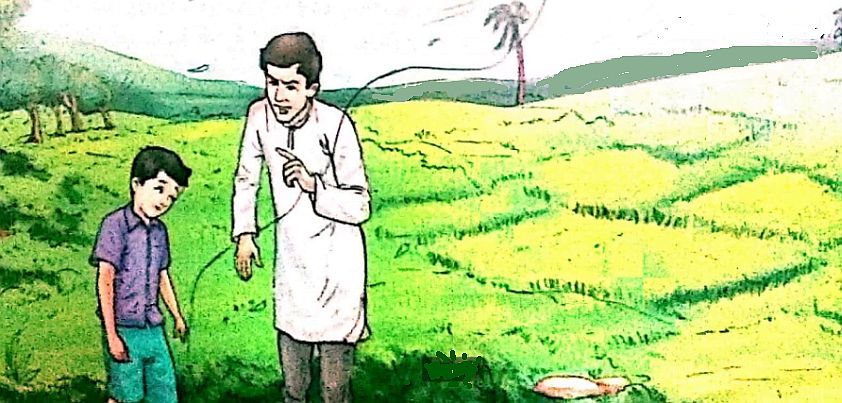 This story by Premchand contrasts two Indian bothers attending boarding school. The older (by five years) is studious, disciplined, serious about his responsibility to look after and guide his younger brother, and consistently fails his grade. The younger brother is the opposite: fun-loving, undisciplined, irresponsible, and consistently tops his class. The major messages of the story are the danger of arrogant pride, and that irrespective of one’s level of education, there is always something to learn from those with more life experience. Themes include education, self-discipline, responsibility, pride, work/life balance, respect for one’s elders. More…
This story by Premchand contrasts two Indian bothers attending boarding school. The older (by five years) is studious, disciplined, serious about his responsibility to look after and guide his younger brother, and consistently fails his grade. The younger brother is the opposite: fun-loving, undisciplined, irresponsible, and consistently tops his class. The major messages of the story are the danger of arrogant pride, and that irrespective of one’s level of education, there is always something to learn from those with more life experience. Themes include education, self-discipline, responsibility, pride, work/life balance, respect for one’s elders. More…
Lob’s Girl
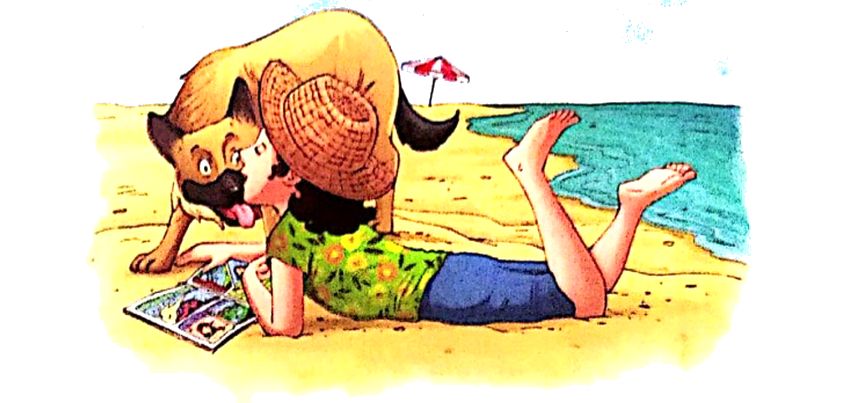 The major themes of this story by Joan Aiken are love, loyalty, family values, death and the supernatural. The moment Lob saw five-year-old Sandy on the beach, it was love at first sight. Lob is a dog: a large, bouncy German Shepherd with “a yard of tongue” that he puts to good use smothering Sandy with affection. As with many girl/boy and dog stories, Lob must overcome several difficulties (in this case by walking the length of England twice!) before joining Sandy’s family. A touching aspect of the story is that Lob’s love is so strong that it transcends death. More…
The major themes of this story by Joan Aiken are love, loyalty, family values, death and the supernatural. The moment Lob saw five-year-old Sandy on the beach, it was love at first sight. Lob is a dog: a large, bouncy German Shepherd with “a yard of tongue” that he puts to good use smothering Sandy with affection. As with many girl/boy and dog stories, Lob must overcome several difficulties (in this case by walking the length of England twice!) before joining Sandy’s family. A touching aspect of the story is that Lob’s love is so strong that it transcends death. More…
Scout’s Honor
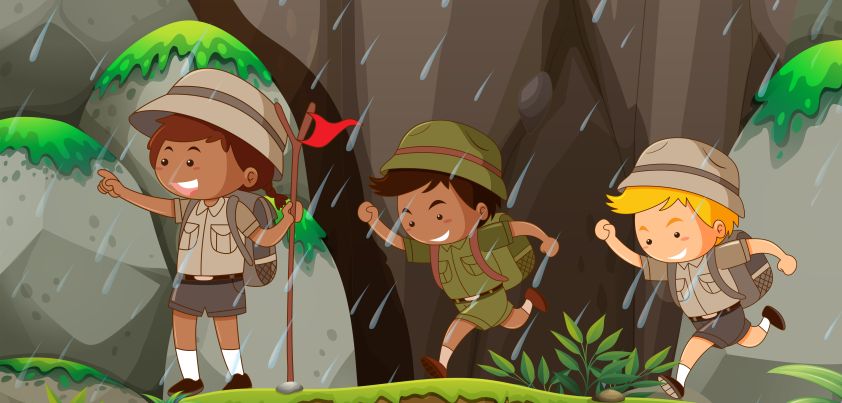 In this story from Edward Wortis (aka Avi), three bumbling friends demonstrate how not to go about passing a Boy Scout camping test. It is fortunate the story is set in the 1940s. If three nine year-olds were to set off as poorly prepared as they were these days, the ending probably wouldn’t be as happy. The major theme is that taking part in a challenge is more important that completing or winning it. Other themes: friendship, pride, poor planning and preparation, toughness (in this case being prepared to admit when something is too difficult), and scout’s honor (applied selectively!) More…
In this story from Edward Wortis (aka Avi), three bumbling friends demonstrate how not to go about passing a Boy Scout camping test. It is fortunate the story is set in the 1940s. If three nine year-olds were to set off as poorly prepared as they were these days, the ending probably wouldn’t be as happy. The major theme is that taking part in a challenge is more important that completing or winning it. Other themes: friendship, pride, poor planning and preparation, toughness (in this case being prepared to admit when something is too difficult), and scout’s honor (applied selectively!) More…
The Grandfather and the Python
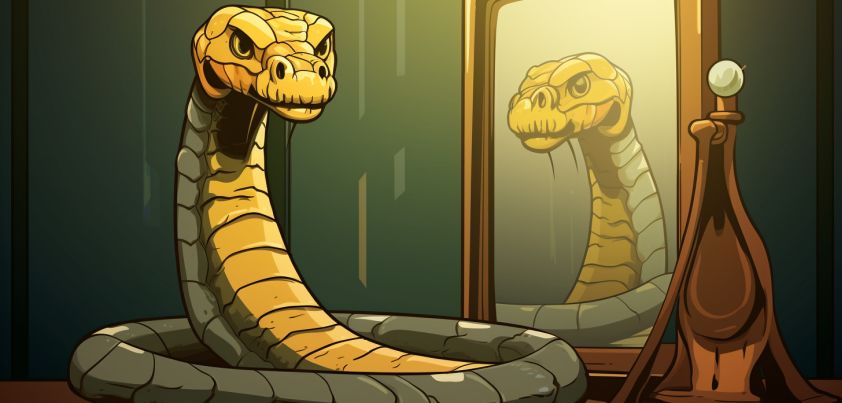 On the surface, this story by Ruskin Bond is a light-hearted tale about a vain python that falls in love with its own reflection. However, like Bond’s A Tiger in the House, the story raises serious questions about the capture and confinement of wild animals. Rather than being in “love”, the python is more likely confused by its reflection after being isolated from its kind for years. Moreover, if the python has no jungle survival experience, it is unlikely to live long when it finally emerges from its cage. Themes include eccentricity, fear, tolerance, vanity, (unintentional) animal cruelty. More…
On the surface, this story by Ruskin Bond is a light-hearted tale about a vain python that falls in love with its own reflection. However, like Bond’s A Tiger in the House, the story raises serious questions about the capture and confinement of wild animals. Rather than being in “love”, the python is more likely confused by its reflection after being isolated from its kind for years. Moreover, if the python has no jungle survival experience, it is unlikely to live long when it finally emerges from its cage. Themes include eccentricity, fear, tolerance, vanity, (unintentional) animal cruelty. More…
My Father Goes to Court
 The message of this Carlos Bulosan story is that money can’t buy health and happiness. The children of a poor family, full of vitality and laughter, spend a lot of time playing outdoors. Their rich neighbor, who keeps his children secluded indoors, files a legal complaint against the poor family for standing outside his house and enjoying the aroma of his food. Their father goes to court and uses a novel approach to win the case. Themes include family, social inequality, standing up for one’s rights, justice, the importance of fresh air, exercise and laughter for a healthy, happy life. More…
The message of this Carlos Bulosan story is that money can’t buy health and happiness. The children of a poor family, full of vitality and laughter, spend a lot of time playing outdoors. Their rich neighbor, who keeps his children secluded indoors, files a legal complaint against the poor family for standing outside his house and enjoying the aroma of his food. Their father goes to court and uses a novel approach to win the case. Themes include family, social inequality, standing up for one’s rights, justice, the importance of fresh air, exercise and laughter for a healthy, happy life. More…
What the Old Man Does is Always Right
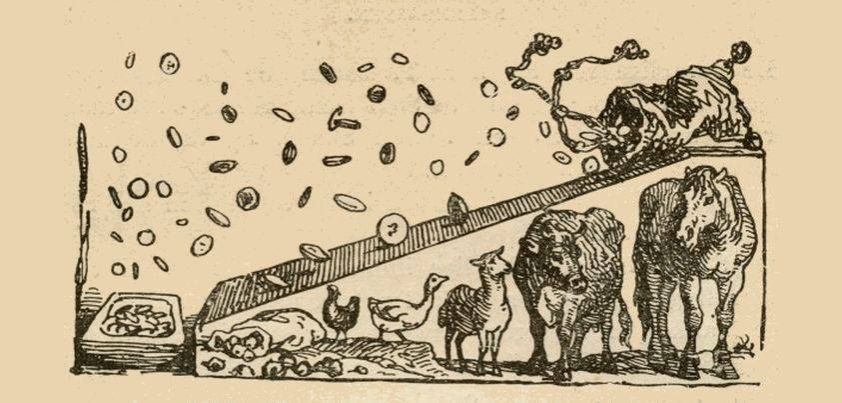 This story by Hans Christian Andersen is about an old man and his loving wife who never sees a problem with anything he does. The only thing they own of any value is a horse, which they decide to sell or trade for something more useful. The man sets off for town and, after several trades along the way, comes home with a bag of rotten apples. As always, his wife was delighted with the result. Andersen called this story one of his best ever tales… but was it really his work? More…
This story by Hans Christian Andersen is about an old man and his loving wife who never sees a problem with anything he does. The only thing they own of any value is a horse, which they decide to sell or trade for something more useful. The man sets off for town and, after several trades along the way, comes home with a bag of rotten apples. As always, his wife was delighted with the result. Andersen called this story one of his best ever tales… but was it really his work? More…
The Reluctant Dragon
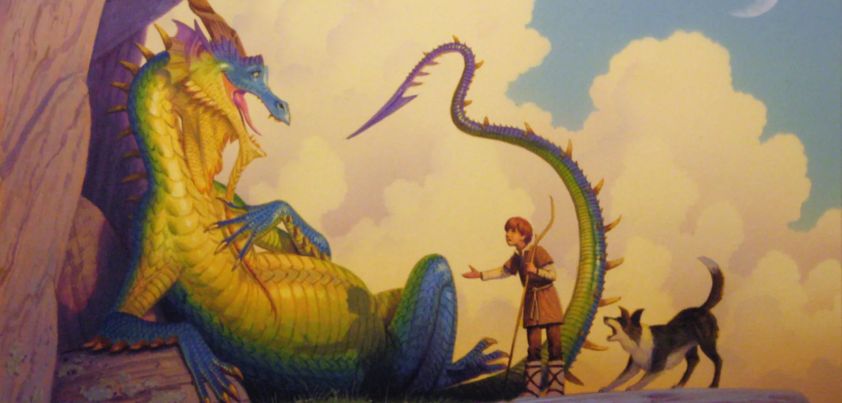 In the popular legend of St. George and the Dragon, a courageous soldier rescues a princess chosen as a tribute (and next meal) for a marauding dragon. This witty, light-hearted tale from Kenneth Grahame parodies this legend. However, there is no princess and the dragon in question is friendly, cultured and, as he admits himself, lazy. The major theme is that the best way to resolve a problem is to sit down and talk about it. Other themes: friendship, daring to be “different” (Boy and dragon); judging by appearances, bloodsports (the villagers); maintaining face/reputation, compassion (St. George). More…
In the popular legend of St. George and the Dragon, a courageous soldier rescues a princess chosen as a tribute (and next meal) for a marauding dragon. This witty, light-hearted tale from Kenneth Grahame parodies this legend. However, there is no princess and the dragon in question is friendly, cultured and, as he admits himself, lazy. The major theme is that the best way to resolve a problem is to sit down and talk about it. Other themes: friendship, daring to be “different” (Boy and dragon); judging by appearances, bloodsports (the villagers); maintaining face/reputation, compassion (St. George). More…
Miss Awful
 Arthur Cavanaugh’s Miss Awful is about how a sensitive third-grader (Roger) deals with a substitute school teacher who is the direct opposite of his regular one. While the regular teacher is flexible and empowers the children in her class, the substitute (who Roger nicknames Miss Awful) is an ‘old-style’ strict disciplinarian. The change affects Roger so much that he begins to show signs of depression. His fellow students are also unhappy, and the children decide to play a cruel joke on Miss Awful. As the joke plays out some of them, including Roger, realize they may have seriously misjudged her. More…
Arthur Cavanaugh’s Miss Awful is about how a sensitive third-grader (Roger) deals with a substitute school teacher who is the direct opposite of his regular one. While the regular teacher is flexible and empowers the children in her class, the substitute (who Roger nicknames Miss Awful) is an ‘old-style’ strict disciplinarian. The change affects Roger so much that he begins to show signs of depression. His fellow students are also unhappy, and the children decide to play a cruel joke on Miss Awful. As the joke plays out some of them, including Roger, realize they may have seriously misjudged her. More…
Ribbons
 This excerpt from Laurence Yep’s book of the same name is about three kinds of ribbons: the satin ribbons on protagonist Stacy’s ballet shoes; the silk ribbons traditionally used in Chinese foot binding; and the invisible ribbon binding grandmother, mother and daughter at the end of the story. The central theme is understanding. Already unhappy about interrupted ballet lessons and resentful of her brother’s seemingly favorable treatment, Stacy reacts angrily to her grandmother’s inexplicable rage over her ballet ribbons. Things change when she learns the old woman’s painful secret. Other themes: family, cultural adjustment, courage, passion, sacrifice, connection. More…
This excerpt from Laurence Yep’s book of the same name is about three kinds of ribbons: the satin ribbons on protagonist Stacy’s ballet shoes; the silk ribbons traditionally used in Chinese foot binding; and the invisible ribbon binding grandmother, mother and daughter at the end of the story. The central theme is understanding. Already unhappy about interrupted ballet lessons and resentful of her brother’s seemingly favorable treatment, Stacy reacts angrily to her grandmother’s inexplicable rage over her ballet ribbons. Things change when she learns the old woman’s painful secret. Other themes: family, cultural adjustment, courage, passion, sacrifice, connection. More…
Her Hands That Held the Stars
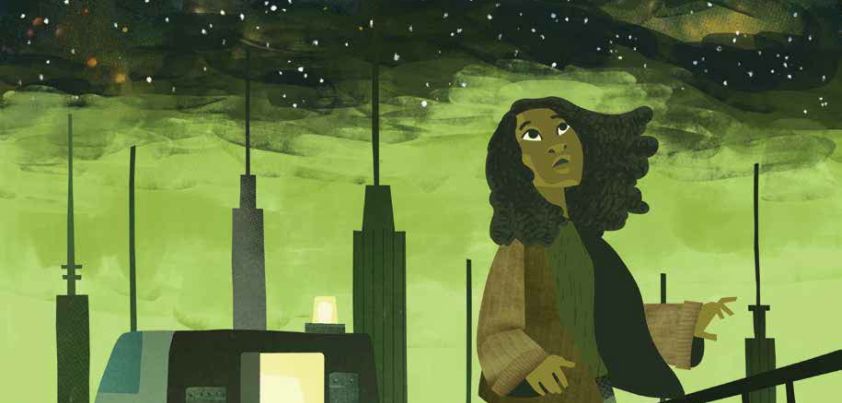 This story by Rebecca Birch for Cricket Magazine takes place in a future world where people live in tall towers and the air is so polluted that they cannot see stars through their windows. The only way to see them is to get above the “eversmog” by standing on top of one of the towers. This is so dangerous that it requires a special key. A disobedient but determined twelve-year-old “borrows” one of these keys. While gazing at the stars in awe, she learns that she has a special destiny. Themes: the wonder of nature, environmental degradation, courage, ambition, destiny. More…
This story by Rebecca Birch for Cricket Magazine takes place in a future world where people live in tall towers and the air is so polluted that they cannot see stars through their windows. The only way to see them is to get above the “eversmog” by standing on top of one of the towers. This is so dangerous that it requires a special key. A disobedient but determined twelve-year-old “borrows” one of these keys. While gazing at the stars in awe, she learns that she has a special destiny. Themes: the wonder of nature, environmental degradation, courage, ambition, destiny. More…
Mother and Daughter
 In this story from Gary Soto, the close relationship between a struggling single mother and her eighth-grade daughter is tested by a wardrobe malfunction at a school dance. Mrs. Moreno is a flamboyant, hard-working, devoted mother. Her daughter Yollie appears genuinely appreciative of her mother’s efforts and understanding of their financial position. After fleeing the fall dance to avoid embarrassment, Yollie directs her frustration and anger toward her mother. It is Mrs Moreno, not Yollie, who cries herself to sleep that night. The themes: motherly love and the hurt that can be caused by a single thoughtless action. More…
In this story from Gary Soto, the close relationship between a struggling single mother and her eighth-grade daughter is tested by a wardrobe malfunction at a school dance. Mrs. Moreno is a flamboyant, hard-working, devoted mother. Her daughter Yollie appears genuinely appreciative of her mother’s efforts and understanding of their financial position. After fleeing the fall dance to avoid embarrassment, Yollie directs her frustration and anger toward her mother. It is Mrs Moreno, not Yollie, who cries herself to sleep that night. The themes: motherly love and the hurt that can be caused by a single thoughtless action. More…
The Cherry Tree
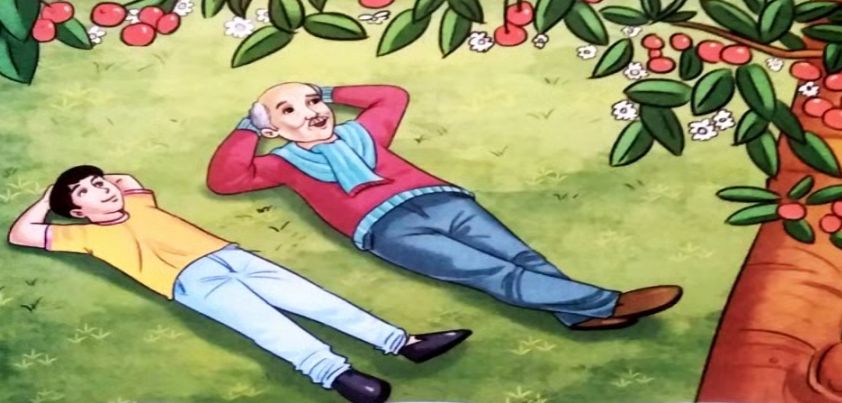 The Cherry Tree from Ruskin Bond contrasts the enduring cycles of nature with the changing world of man. An allegory of parenthood in which a young boy plants a cherry seed and watches as it grows into a tree. He nurtures and protects the tree and, once it is grown, asks: What’s so special about this tree? When his grandfather answers that it’s because they planted it themselves, he responds with pride: is this what it feels to be God? Themes: the beauty and bounty of nature, change, growth, responsibility, caring, achievement, pride. More…
The Cherry Tree from Ruskin Bond contrasts the enduring cycles of nature with the changing world of man. An allegory of parenthood in which a young boy plants a cherry seed and watches as it grows into a tree. He nurtures and protects the tree and, once it is grown, asks: What’s so special about this tree? When his grandfather answers that it’s because they planted it themselves, he responds with pride: is this what it feels to be God? Themes: the beauty and bounty of nature, change, growth, responsibility, caring, achievement, pride. More…
The Nightingale
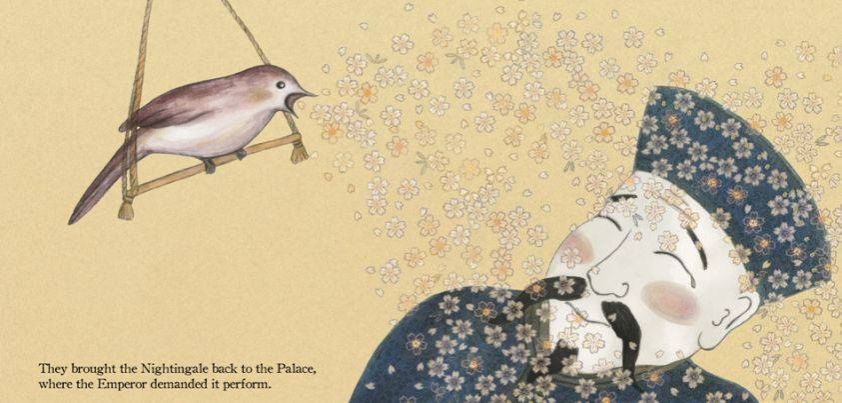 In this story by Hans Christian Andersen, a nightingale living near the palace of the Chinese Emperor sings so beautifully that it becomes famous all over the world. The Emperor loves the nightingale’s song so much that he makes a home for it in the palace. One day the Japanese Emperor sends him a mechanical bird covered in jewels that can sing as well as the nightingale. He replaces the live bird with the mechanical one, and does not come to appreciate the love of the real nightingale until close to death. Themes: artificial vs. natural beauty, friendship, betrayal, loyalty. More…
In this story by Hans Christian Andersen, a nightingale living near the palace of the Chinese Emperor sings so beautifully that it becomes famous all over the world. The Emperor loves the nightingale’s song so much that he makes a home for it in the palace. One day the Japanese Emperor sends him a mechanical bird covered in jewels that can sing as well as the nightingale. He replaces the live bird with the mechanical one, and does not come to appreciate the love of the real nightingale until close to death. Themes: artificial vs. natural beauty, friendship, betrayal, loyalty. More…
The Nightingale and the Rose
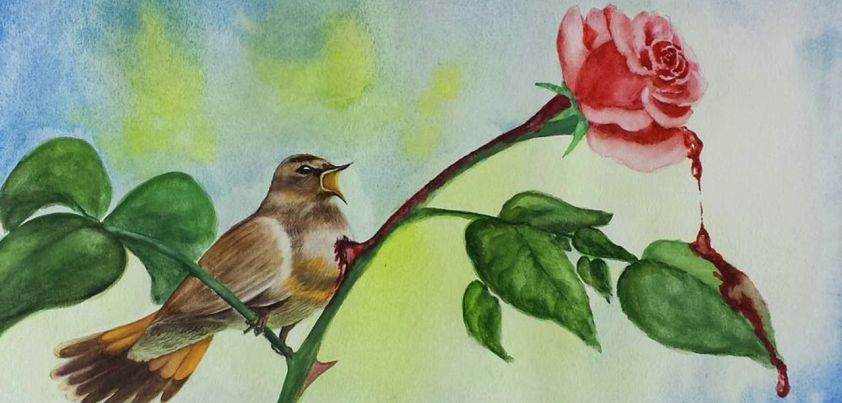 The major themes of this Oscar Wilde story are sacrifice and the nature of love. A nightingale sacrifices its life in exchange for a red rose to help a love-smitten student. The story contrasts the selfless, unconditional love of the nightingale, the student’s naïve infatuation with a fickle girl, and her materialistic love of another. The student, who only knows things that are written down in books, not only laments that the nightingale’s song doesn’t do any practical good but, angry about being rejected, dismisses love as quite unpractical. Other themes include compassion, naivety, materialism, and intellectualism vs. aesthetic appreciation. More…
The major themes of this Oscar Wilde story are sacrifice and the nature of love. A nightingale sacrifices its life in exchange for a red rose to help a love-smitten student. The story contrasts the selfless, unconditional love of the nightingale, the student’s naïve infatuation with a fickle girl, and her materialistic love of another. The student, who only knows things that are written down in books, not only laments that the nightingale’s song doesn’t do any practical good but, angry about being rejected, dismisses love as quite unpractical. Other themes include compassion, naivety, materialism, and intellectualism vs. aesthetic appreciation. More…
Festival of Eid / Idgah
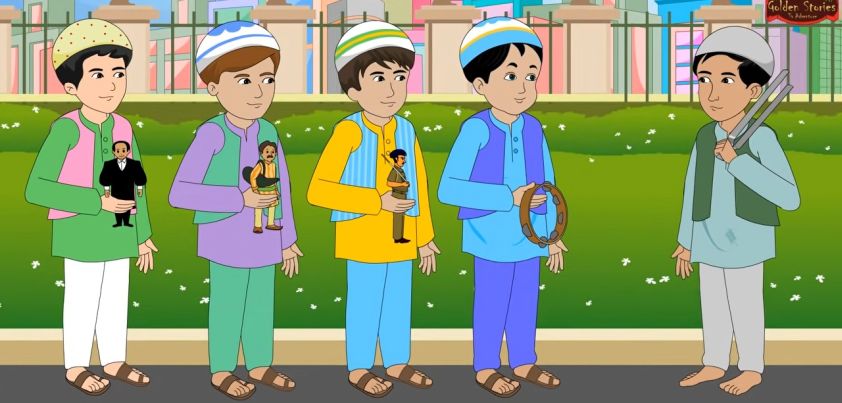 In this well-known Indian children’s story from Premchand, a young orphan foregoes the pleasures enjoyed by friends at a festival to buy a pair of tongs to prevent his poverty-stricken grandmother from burning her hands when cooking. The most obvious themes are related to the boy: poverty, innocence, hope, love, selflessness, temptation and willpower. However, at around 5,000 words, the story also highlights several additional issues. The boy’s friends display materialism and greed, while other themes include religious devotion, superstition (Jinns), village vs. city life and, through the fate of the dolls, the fall of British colonialism. More…
In this well-known Indian children’s story from Premchand, a young orphan foregoes the pleasures enjoyed by friends at a festival to buy a pair of tongs to prevent his poverty-stricken grandmother from burning her hands when cooking. The most obvious themes are related to the boy: poverty, innocence, hope, love, selflessness, temptation and willpower. However, at around 5,000 words, the story also highlights several additional issues. The boy’s friends display materialism and greed, while other themes include religious devotion, superstition (Jinns), village vs. city life and, through the fate of the dolls, the fall of British colonialism. More…
The Stone
 This story from Lloyd Alexander is about Maibon, a poor farmer who is worried about growing old. His troubles begin when he rescues one of the “fair-folk” from under a log and demands one of their famous “un-aging stones” as a reward. As often happens to those who try magic to defy nature, things start to go wrong. Maibon tries several times to throw the stone away. When it keeps reappearing, he has no choice but to return it. Maibon’s life goes back to normal and he learns that aging gracefully with one’s family can be a good thing.
This story from Lloyd Alexander is about Maibon, a poor farmer who is worried about growing old. His troubles begin when he rescues one of the “fair-folk” from under a log and demands one of their famous “un-aging stones” as a reward. As often happens to those who try magic to defy nature, things start to go wrong. Maibon tries several times to throw the stone away. When it keeps reappearing, he has no choice but to return it. Maibon’s life goes back to normal and he learns that aging gracefully with one’s family can be a good thing.
The Scholarship Jacket
 This story by Marta Salinas is about prejudice, privilege and hope. Martha is 14 and about to enter High-School. Her parents are very poor, so she lives with her grandparents. Marta gets top grades, and wants nothing more than for this to be recognized by winning the Grade 8 Scholarship Jacket. She is devastated when she hears two teachers arguing about whether the jacket should go instead to a lesser student whose father is on the School Board. When Martha explains the problem to her grandfather, his answer proves that you don’t need a formal education to acquire great wisdom. More…
This story by Marta Salinas is about prejudice, privilege and hope. Martha is 14 and about to enter High-School. Her parents are very poor, so she lives with her grandparents. Marta gets top grades, and wants nothing more than for this to be recognized by winning the Grade 8 Scholarship Jacket. She is devastated when she hears two teachers arguing about whether the jacket should go instead to a lesser student whose father is on the School Board. When Martha explains the problem to her grandfather, his answer proves that you don’t need a formal education to acquire great wisdom. More…
Eleven
 This children’s story by Sandra Cisneros was initially rejected because the publisher thought the themes were too deep for children. It has since become one of the most widely taught stories in Elementary Schools. A misunderstanding at school over an ugly red sweater spoils a girl’s eleventh birthday. Her teacher is convinced the sweater is the girl’s and demands that she put in on. The girl does so but then breaks down in tears, embarrassing herself in front of the class. This is a “coming of age” story that deals with the difficult concepts of vanity and timidity. More…
This children’s story by Sandra Cisneros was initially rejected because the publisher thought the themes were too deep for children. It has since become one of the most widely taught stories in Elementary Schools. A misunderstanding at school over an ugly red sweater spoils a girl’s eleventh birthday. Her teacher is convinced the sweater is the girl’s and demands that she put in on. The girl does so but then breaks down in tears, embarrassing herself in front of the class. This is a “coming of age” story that deals with the difficult concepts of vanity and timidity. More…
What Do Fish Have to Do with Anything?
 The major theme of this story from Edward Wortis (aka Avi) is closed-mindedness. A struggling single mother still treats her sixth-grader son, Willie, as a young child. She is so preoccupied with her troubles that she doesn’t realize he is now an adolescent. Through prejudice, she shuns a beggar on the street. When Willie asks how to cure the beggar’s unhappiness, her answer is money. The beggar’s answer is cryptic: “What a person needs is always more than they (other people) say.” By this, he means everyone’s situation is different; we need to “open our eyes” to understand their needs. More…
The major theme of this story from Edward Wortis (aka Avi) is closed-mindedness. A struggling single mother still treats her sixth-grader son, Willie, as a young child. She is so preoccupied with her troubles that she doesn’t realize he is now an adolescent. Through prejudice, she shuns a beggar on the street. When Willie asks how to cure the beggar’s unhappiness, her answer is money. The beggar’s answer is cryptic: “What a person needs is always more than they (other people) say.” By this, he means everyone’s situation is different; we need to “open our eyes” to understand their needs. More…
Little Claus and Great Claus
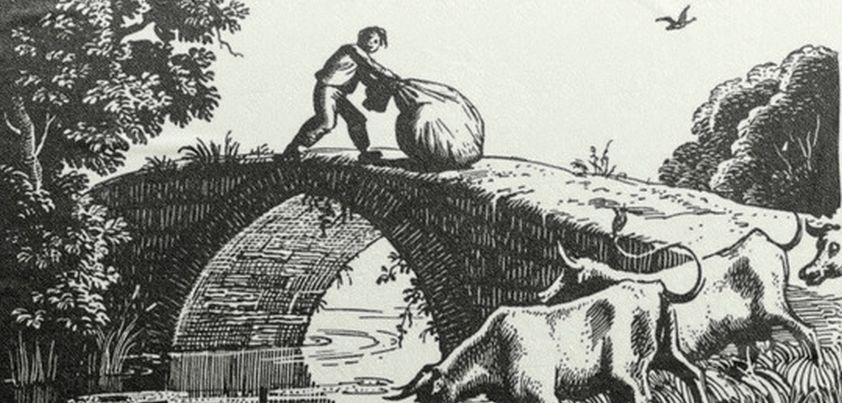 This children’s story by Hans Christian Andersen caused a stir among critics when first released because of the violence involved. A poor farmer who develops a talent for swindling people invents stories to explain the source of his newfound wealth to an envious neighbor.. When the greedy neighbor tries to make money the same way, he suffers greatly. In a fit of anger, the neighbor tries to kill the farmer. However this, too, results in an unexpected windfall for the unscrupulous fraudster. Themes include cleverness, fraud, greed, envy, death, turning the tables. More…
This children’s story by Hans Christian Andersen caused a stir among critics when first released because of the violence involved. A poor farmer who develops a talent for swindling people invents stories to explain the source of his newfound wealth to an envious neighbor.. When the greedy neighbor tries to make money the same way, he suffers greatly. In a fit of anger, the neighbor tries to kill the farmer. However this, too, results in an unexpected windfall for the unscrupulous fraudster. Themes include cleverness, fraud, greed, envy, death, turning the tables. More…
The Serial Garden
 Joan Aiken’s Serial Garden is part of a collection of old-style children’s stories about the Armitage family, who seem to think it completely normal as impossible events take place around them. In the story, a picture on a cereal packet leads a young boy to a magical garden that has been inhabited for fifty years by a haughty princess pining for her lost lover. The boy almost manages to reunite the couple, but his mother accidentally dashes his plan at the last minute. Fortunately, the princess now has a dog to keep her company for the next fifty years! More…
Joan Aiken’s Serial Garden is part of a collection of old-style children’s stories about the Armitage family, who seem to think it completely normal as impossible events take place around them. In the story, a picture on a cereal packet leads a young boy to a magical garden that has been inhabited for fifty years by a haughty princess pining for her lost lover. The boy almost manages to reunite the couple, but his mother accidentally dashes his plan at the last minute. Fortunately, the princess now has a dog to keep her company for the next fifty years! More…
Seibei and His Gourds (The Artist)
 This story from Shiga Naoya uses situational irony to highlight the importance of encouraging people to pursue their artistic passions. Seibei has a fascination with decorative gourds. He spends all his free time buying natural pods and turning them into the polished decorative pieces. When this causes problems at school, Seibei’s teacher shames his parents into forbidding the hobby and destroying his gourd collection. Unbeknown to all, this may have cost Seibei a lucrative, satisfying career. The disheartened boy complies, but soon takes up another artistic interest. Themes: (Seibei) art, passion, talent, obedience, resilience; (his parents) narrow-mindedness. More…
This story from Shiga Naoya uses situational irony to highlight the importance of encouraging people to pursue their artistic passions. Seibei has a fascination with decorative gourds. He spends all his free time buying natural pods and turning them into the polished decorative pieces. When this causes problems at school, Seibei’s teacher shames his parents into forbidding the hobby and destroying his gourd collection. Unbeknown to all, this may have cost Seibei a lucrative, satisfying career. The disheartened boy complies, but soon takes up another artistic interest. Themes: (Seibei) art, passion, talent, obedience, resilience; (his parents) narrow-mindedness. More…
Mowgli’s Brothers
 The major themes of this children’s story from Rudyard Kipling’s Jungle Book are nature vs. nurture, identity, and respect for the law. When an abandoned “man cub” is adopted by a family of wolves, the wolf parents face two challenges: having the child accepted as a member of the Pack, and protecting him from a crazed tiger who does not follow the “Law of the Jungle”. Things go well until the awakening of the boy’s human reasoning capacity leads to an existential crisis and his eventual expulsion from the Pack. Other themes: abandonment and adoption, family, community, envy, survival. More…
The major themes of this children’s story from Rudyard Kipling’s Jungle Book are nature vs. nurture, identity, and respect for the law. When an abandoned “man cub” is adopted by a family of wolves, the wolf parents face two challenges: having the child accepted as a member of the Pack, and protecting him from a crazed tiger who does not follow the “Law of the Jungle”. Things go well until the awakening of the boy’s human reasoning capacity leads to an existential crisis and his eventual expulsion from the Pack. Other themes: abandonment and adoption, family, community, envy, survival. More…
Raymond’s Run
 Raymond’s Run by Toni Cade Bambara is about a feisty school girl nick-named ‘Squeaky’ who helps take care of Raymond, her mentally challenged older brother. Squeaky is a very talented runner. She trains hard and desperately wants to win this years’ May Day race to show up an annoying and over-confidant new girl in town. During the race she sees Raymond running along the outside of the track keeping pace with her. She suddenly decides that winning races doesn’t matter as much as it used to. Themes: responsibility (care-giving), identity, independence, alienation, pride, rivalry, personal growth, respect. More…
Raymond’s Run by Toni Cade Bambara is about a feisty school girl nick-named ‘Squeaky’ who helps take care of Raymond, her mentally challenged older brother. Squeaky is a very talented runner. She trains hard and desperately wants to win this years’ May Day race to show up an annoying and over-confidant new girl in town. During the race she sees Raymond running along the outside of the track keeping pace with her. She suddenly decides that winning races doesn’t matter as much as it used to. Themes: responsibility (care-giving), identity, independence, alienation, pride, rivalry, personal growth, respect. More…
The Circuit
 This is a chapter from the The Circuit: Stories from the Life of a Migrant Child, a collection of autobiographical short stories by Francisco Jiménez. The title refers to the way many migrant laborers move from place to place over a year in search of seasonal farm work. For the children of this close-knit family, this means poor living conditions, never being in one place long enough to have permanent friends, working in the fields when old enough, and limited opportunities to attend school. Themes include family, poverty, perseverance, impermanence, loneliness, language and communication, child labor, lack of educational opportunities. More…
This is a chapter from the The Circuit: Stories from the Life of a Migrant Child, a collection of autobiographical short stories by Francisco Jiménez. The title refers to the way many migrant laborers move from place to place over a year in search of seasonal farm work. For the children of this close-knit family, this means poor living conditions, never being in one place long enough to have permanent friends, working in the fields when old enough, and limited opportunities to attend school. Themes include family, poverty, perseverance, impermanence, loneliness, language and communication, child labor, lack of educational opportunities. More…
The Blue Umbrella
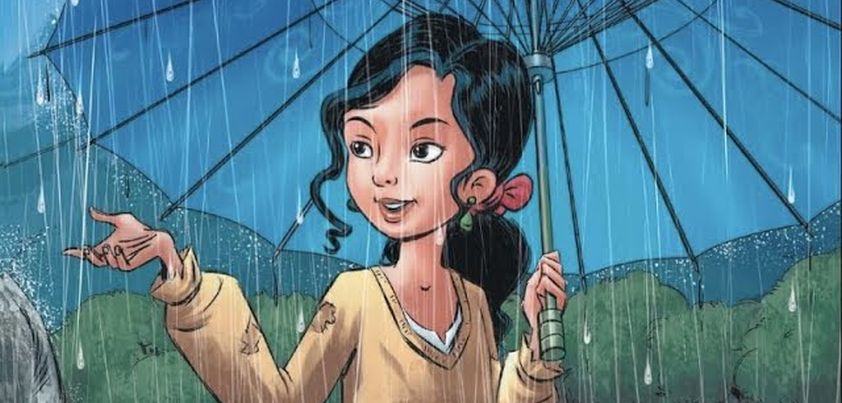 In this story by Ruskin Bond, a poor girl from the Himalayan foothills trades her tiger’s-claw lucky charm for a magnificent, though impractical silk umbrella. She is the envy of her village, and vainly parades it everywhere she goes. The village teashop owner covets the umbrella, and tries to acquire it by fair means and foul. Ultimately, the girl and shop owner realize their mutual folly. The girl gives him the umbrella, which he shares with the whole village, and she is greatly rewarded for her kindness. Themes include innocence, beauty, vanity, envy, materialism and greed, compassion, kindness and generosity. More…
In this story by Ruskin Bond, a poor girl from the Himalayan foothills trades her tiger’s-claw lucky charm for a magnificent, though impractical silk umbrella. She is the envy of her village, and vainly parades it everywhere she goes. The village teashop owner covets the umbrella, and tries to acquire it by fair means and foul. Ultimately, the girl and shop owner realize their mutual folly. The girl gives him the umbrella, which he shares with the whole village, and she is greatly rewarded for her kindness. Themes include innocence, beauty, vanity, envy, materialism and greed, compassion, kindness and generosity. More…
The Fir Tree
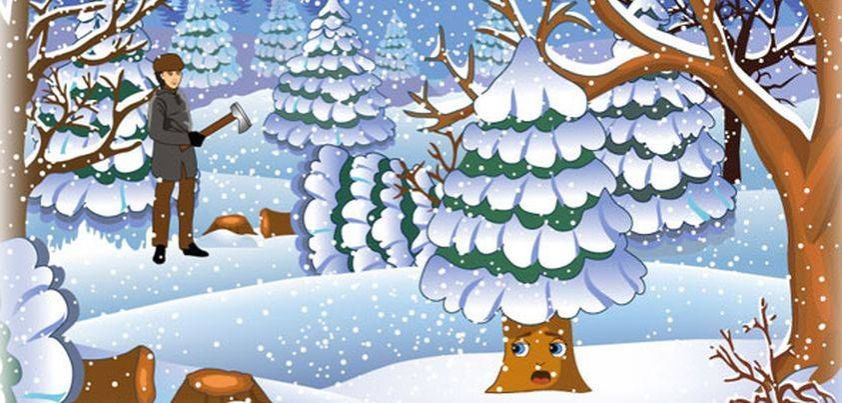 This story by the Danish poet and writer Hans Christian Andersen is about a tree that grows up never being satisfied with its life. There is only one day in the tree’s life (a Christmas Eve) that it feels truly happy. After Christmas, people throw it into a dark attic. While waiting for what comes next, the tree realizes there were many other good things in its life that should have been enjoyed. It is excited when finally brought out into the sun, only to meet a sad end that will make you never want a real Christmas tree again. More…
This story by the Danish poet and writer Hans Christian Andersen is about a tree that grows up never being satisfied with its life. There is only one day in the tree’s life (a Christmas Eve) that it feels truly happy. After Christmas, people throw it into a dark attic. While waiting for what comes next, the tree realizes there were many other good things in its life that should have been enjoyed. It is excited when finally brought out into the sun, only to meet a sad end that will make you never want a real Christmas tree again. More…
A Child’s Dream of a Star
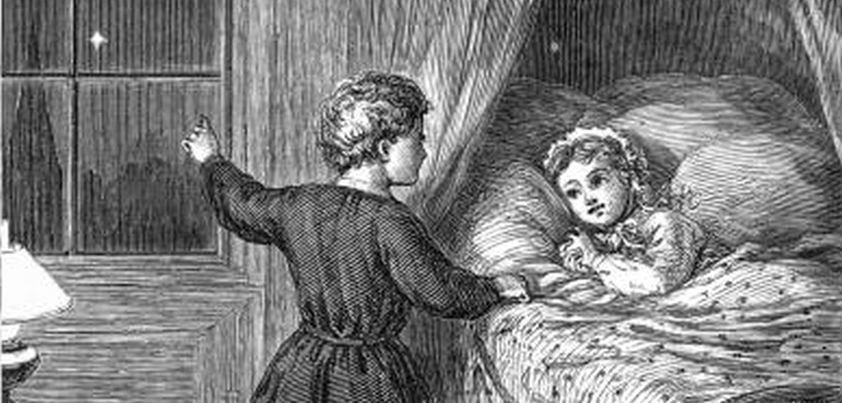 A major theme of this heart-warming 19th Century children’s story from Charles Dickens is what comes after death. Although children today are more likely to have been exposed to the concept of the hereafter than their 1871 counterparts, the story is still used as a reading text in many grade schools. In addition to being a beautifully written piece of prose, it contains several other important themes. These include: 1) the wonder and interdependence of the natural world; 2) brother & sisterly love and devotion; 3) the importance of family; and 4) how life can sometimes seem unfair. More…
A major theme of this heart-warming 19th Century children’s story from Charles Dickens is what comes after death. Although children today are more likely to have been exposed to the concept of the hereafter than their 1871 counterparts, the story is still used as a reading text in many grade schools. In addition to being a beautifully written piece of prose, it contains several other important themes. These include: 1) the wonder and interdependence of the natural world; 2) brother & sisterly love and devotion; 3) the importance of family; and 4) how life can sometimes seem unfair. More…
President Cleveland, Where Are You?
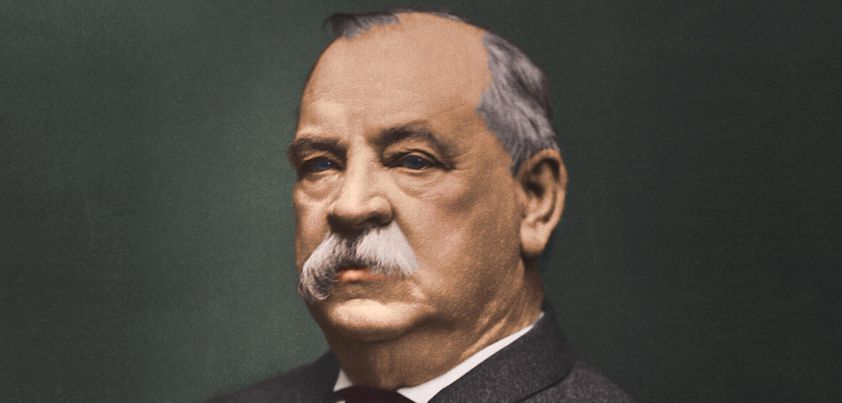 This coming of age story by Robert Cormier is set in simpler times (the 1930s), where the highlight of the day for many young boys was collecting and swapping trading cards to complete a full set. There is intense rivalry between protagonist Jerry, his friend Roger, and their arch-rival Rollie. Initially it is over Cowboy cards but, when these are replaced by President cards, all the boys in their neighborhood are desperate to find the elusive President Cleveland card. Jerry is the first to find one, but doesn’t have it for long. Themes: family, friendship, choices, sacrifice. More…
This coming of age story by Robert Cormier is set in simpler times (the 1930s), where the highlight of the day for many young boys was collecting and swapping trading cards to complete a full set. There is intense rivalry between protagonist Jerry, his friend Roger, and their arch-rival Rollie. Initially it is over Cowboy cards but, when these are replaced by President cards, all the boys in their neighborhood are desperate to find the elusive President Cleveland card. Jerry is the first to find one, but doesn’t have it for long. Themes: family, friendship, choices, sacrifice. More…
Greyling
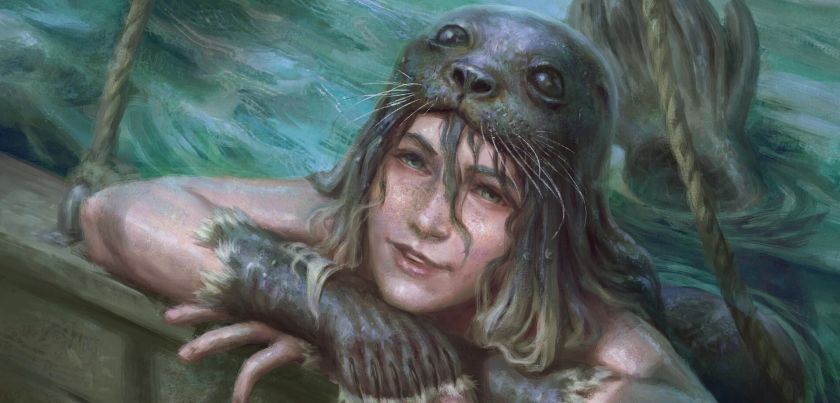 This story from Jane Yolen is about a baby ‘selchie’ (human/seal shapeshifter) that is washed up on a beach and raised by a childless fisherman and his wife. Their lives change fifteen years later when a huge storm destroys their hut and threatens to drown the fisherman at sea. The main theme of the story is selfishness. By ‘imprisoning’ the boy on land in the name of love, the fisherman’s wife prevents him from fulfilling his destiny. Other themes: the power of nature, freedom, the supernatural. The story’s message: true love involves letting go and empowering children to be themselves. More…
This story from Jane Yolen is about a baby ‘selchie’ (human/seal shapeshifter) that is washed up on a beach and raised by a childless fisherman and his wife. Their lives change fifteen years later when a huge storm destroys their hut and threatens to drown the fisherman at sea. The main theme of the story is selfishness. By ‘imprisoning’ the boy on land in the name of love, the fisherman’s wife prevents him from fulfilling his destiny. Other themes: the power of nature, freedom, the supernatural. The story’s message: true love involves letting go and empowering children to be themselves. More…
Master Jacob
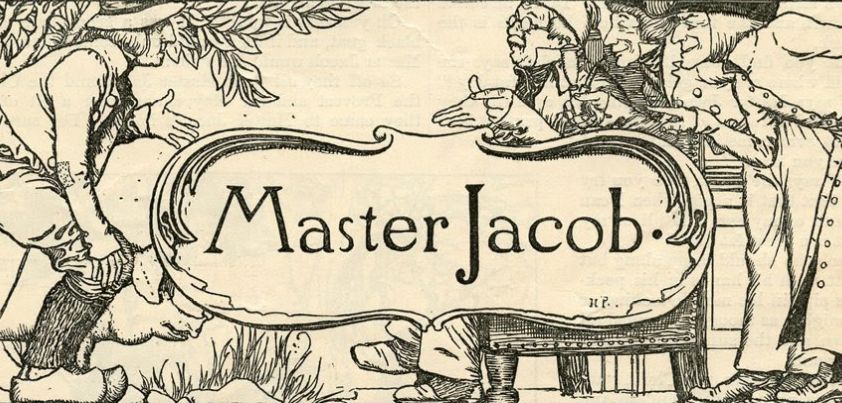 The story by Howard Pyle is similar to the “trickster” narratives found in many folktales. Three greedy community leaders (a priest, a provost, and the town mayor) decide to trick an unsuspecting farmer out of a fat pig (or is it a dog?) he is taking to market. Later, the sly farmer turns the tables with three tricks of his own. For his last trick, he tells them the truth! The tricksters woe their foolishness at the bottom of a deep pit, and the farmer ends up with a lot of their money. Themes: greed, cleverness, revenge, distrust. More…
The story by Howard Pyle is similar to the “trickster” narratives found in many folktales. Three greedy community leaders (a priest, a provost, and the town mayor) decide to trick an unsuspecting farmer out of a fat pig (or is it a dog?) he is taking to market. Later, the sly farmer turns the tables with three tricks of his own. For his last trick, he tells them the truth! The tricksters woe their foolishness at the bottom of a deep pit, and the farmer ends up with a lot of their money. Themes: greed, cleverness, revenge, distrust. More…
LAFFF
 The Asian-American protagonist in this story by Lensey Namioka desperately wants to impress her parents by winning the Best Story Award for her grade in her school’s annual writing competition. Meanwhile, a nerdy classmate and neighbor has developed a time machine in his garage. She is the only one who knows about it and, when she can’t come up with a story she is happy with, she decides to travel forward in time to copy the winning entry. Her major concern is coming face-to-face with herself! Themes include pressure to succeed, friendship, time travel, cheating. More…
The Asian-American protagonist in this story by Lensey Namioka desperately wants to impress her parents by winning the Best Story Award for her grade in her school’s annual writing competition. Meanwhile, a nerdy classmate and neighbor has developed a time machine in his garage. She is the only one who knows about it and, when she can’t come up with a story she is happy with, she decides to travel forward in time to copy the winning entry. Her major concern is coming face-to-face with herself! Themes include pressure to succeed, friendship, time travel, cheating. More…
Pret in the House / Ghost Trouble
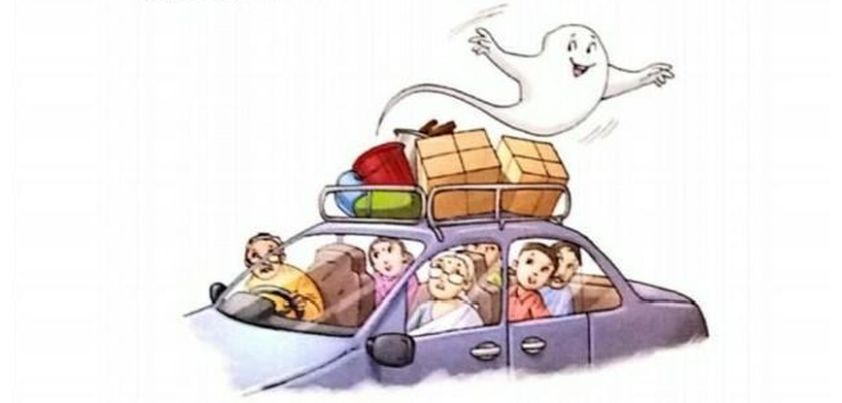 This light-hearted children’s tale from master storyteller Ruskin Bond reflects a once common Indian belief that ghosts and other spirits (pret) inhabit certain types of tree. If something happens to such a tree, these are set free and must find a new home. There are many kinds of pret. Fortunately, the one that moves into a family’s house in this story is of the mischievous rather than dangerous or hungry variety. When its playful pranks become too annoying, the family decides to move away. This does not prove as easy as they thought! Themes: superstition, progress, family connectedness. More…
This light-hearted children’s tale from master storyteller Ruskin Bond reflects a once common Indian belief that ghosts and other spirits (pret) inhabit certain types of tree. If something happens to such a tree, these are set free and must find a new home. There are many kinds of pret. Fortunately, the one that moves into a family’s house in this story is of the mischievous rather than dangerous or hungry variety. When its playful pranks become too annoying, the family decides to move away. This does not prove as easy as they thought! Themes: superstition, progress, family connectedness. More…
Seventh Grade
 Middle School marks the beginning of early adolescence. Hormones rage, bodies begin to change, and ‘new’ kinds of relationships form with members of the opposite sex. This story by Gary Soto is about Victor, a boy just starting Seventh Grade. He has promised himself that before the year is out he is going to hook up with Terresa, a girl he has known through their church for several years. The only subject they share at school is French, and Victor’s comical efforts to impress almost lead to disaster. The message: Don’t try to fake who you are. Just be yourself! (1,900 words) More…
Middle School marks the beginning of early adolescence. Hormones rage, bodies begin to change, and ‘new’ kinds of relationships form with members of the opposite sex. This story by Gary Soto is about Victor, a boy just starting Seventh Grade. He has promised himself that before the year is out he is going to hook up with Terresa, a girl he has known through their church for several years. The only subject they share at school is French, and Victor’s comical efforts to impress almost lead to disaster. The message: Don’t try to fake who you are. Just be yourself! (1,900 words) More…
Teacher Tamer
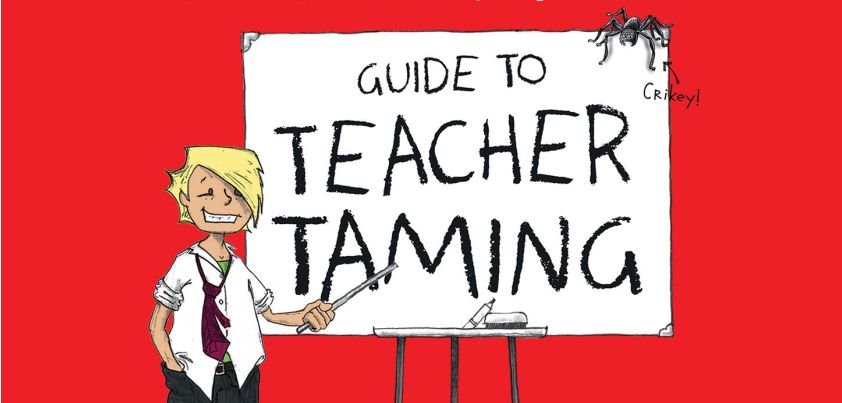 Edward Wortis (aka Avi)’s Teacher Tamer is a coming of age story about unfairness, revenge, peer pressure, compassion and courage. A burnt-out fifth grade teacher regularly punishes the most promising student in class for things he did not do. In a moment of anger, the boy plots revenge and boasts about it to classmates. Although the class bully questions his courage, others say that if he succeeds he will become the class hero. He feels pressured into going ahead. The plan ends in failure, but by the end of the story he is hailed by the nickname Teacher Tamer. More…
Edward Wortis (aka Avi)’s Teacher Tamer is a coming of age story about unfairness, revenge, peer pressure, compassion and courage. A burnt-out fifth grade teacher regularly punishes the most promising student in class for things he did not do. In a moment of anger, the boy plots revenge and boasts about it to classmates. Although the class bully questions his courage, others say that if he succeeds he will become the class hero. He feels pressured into going ahead. The plan ends in failure, but by the end of the story he is hailed by the nickname Teacher Tamer. More…
In the Great Walled Country
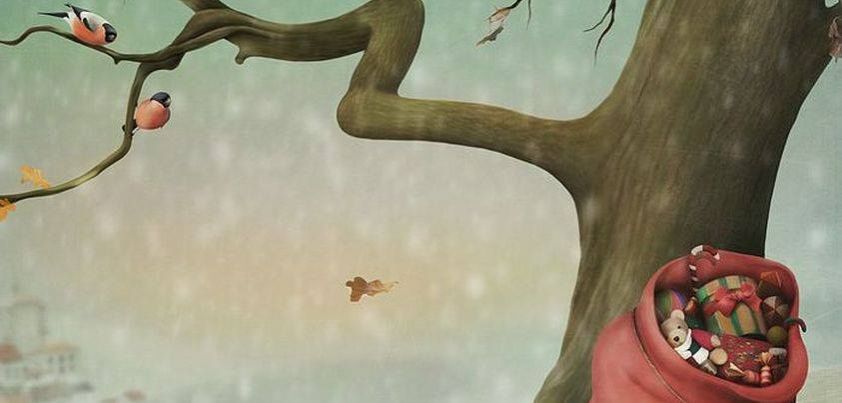 This Christmas story by R. M. Alden tells of a strange land of ice and snow where children never grow up. Being so close to the North Pole, Santa Claus doesn’t deliver presents to people’s houses. He hangs them on trees in a forest. On Christmas Eve, everyone goes out and chooses gifts to give to their family and friends. One year, a stranger visits and convinces the child king that it would be better to change the law so that people collected presents for themselves rather than others. The result was not what he expected. More…
This Christmas story by R. M. Alden tells of a strange land of ice and snow where children never grow up. Being so close to the North Pole, Santa Claus doesn’t deliver presents to people’s houses. He hangs them on trees in a forest. On Christmas Eve, everyone goes out and chooses gifts to give to their family and friends. One year, a stranger visits and convinces the child king that it would be better to change the law so that people collected presents for themselves rather than others. The result was not what he expected. More…
The Golden Windows
 This story by Laura E. Richards is about a poor farm boy who, at the end of most working days, would sit on top of a hill and look at a far-away house that appeared to have golden windows. As he did so, he wished that he could live in a wonderful house like that. One day he sets out to find the house. When he gets there, he is disappointed to learn that the house doesn’t have golden windows. A little girl takes him to the top of her hill and shows him the real house with golden windows. More…
This story by Laura E. Richards is about a poor farm boy who, at the end of most working days, would sit on top of a hill and look at a far-away house that appeared to have golden windows. As he did so, he wished that he could live in a wonderful house like that. One day he sets out to find the house. When he gets there, he is disappointed to learn that the house doesn’t have golden windows. A little girl takes him to the top of her hill and shows him the real house with golden windows. More…
The Selfish Giant
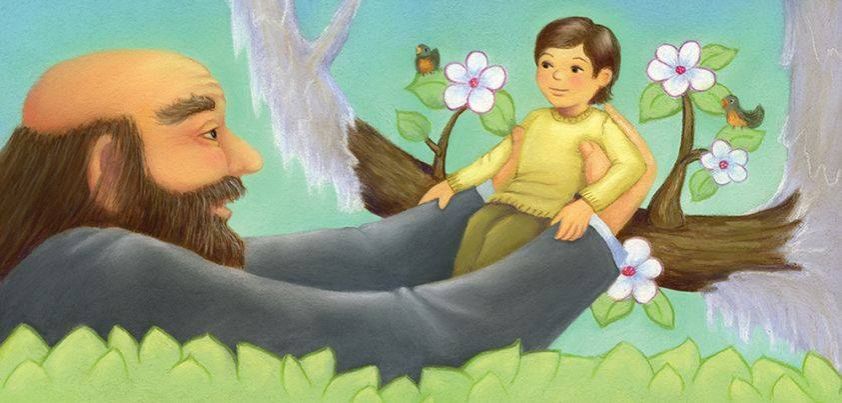 The Irish writer Oscar Wilde is known for his plays, his novel The Picture of Dorian Gray, and his short stories. He also wrote children’s stories, and this is one of the best known of these. A giant finds that his beautiful garden has become a playground for children. He drives them away and builds a wall around it. The seasons close in and his castle becomes a cold, miserable place. Redemption comes in the form of a small child the giant comes to love. The two main themes of the story are greed vs sharing, and Christian love. More…
The Irish writer Oscar Wilde is known for his plays, his novel The Picture of Dorian Gray, and his short stories. He also wrote children’s stories, and this is one of the best known of these. A giant finds that his beautiful garden has become a playground for children. He drives them away and builds a wall around it. The seasons close in and his castle becomes a cold, miserable place. Redemption comes in the form of a small child the giant comes to love. The two main themes of the story are greed vs sharing, and Christian love. More…
Dirk the Protector
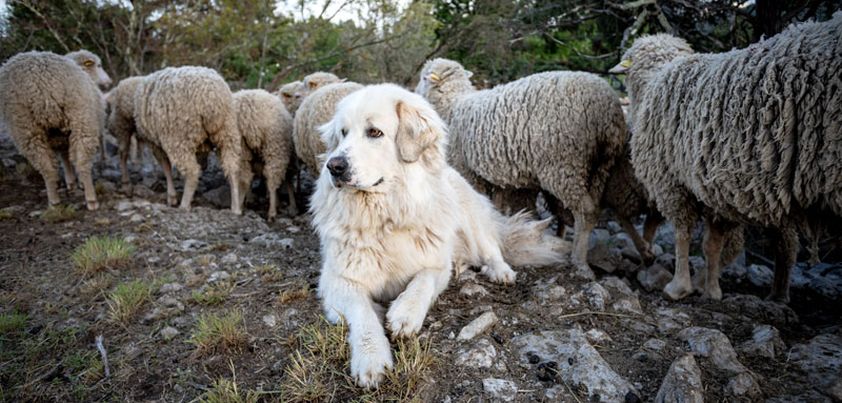 This memoir by Gary Paulsen looks back to a time when, as a “street kid”, he not only had to fend for himself after school, but also had to be constantly on the lookout for a gang of bullies who liked to harass him. Relief from the bullies came in the form of a big, rangy, right on the edge of ugly dog he describes as as close to having a live nuclear weapon as you can get. When no longer needed, the dog moves on to its next protection job. Themes: self-sufficiency, courage, bullying, friendship, letting go. More…
This memoir by Gary Paulsen looks back to a time when, as a “street kid”, he not only had to fend for himself after school, but also had to be constantly on the lookout for a gang of bullies who liked to harass him. Relief from the bullies came in the form of a big, rangy, right on the edge of ugly dog he describes as as close to having a live nuclear weapon as you can get. When no longer needed, the dog moves on to its next protection job. Themes: self-sufficiency, courage, bullying, friendship, letting go. More…
Ghost of the Lagoon
 Set on the beautiful Pacific island of Bora Bora, this exciting adventure tale from Armstrong Sperry involves a boy (Mako), his dog and a monster from the sea. When Mako learns that Tupa, the “ghost of the lagoon”, was responsible for the death of his father, he swears revenge. It is almost as if Tupa were listening. The monster attacks Mako’s canoe the very next evening. Themes include superstition, vengeance, self-reliance, courage and possibly greed… rather than satisfaction and pride, the main thing on Mako’s mind afterwards seems to be a large reward that was on offer for Tupa’s death! More…
Set on the beautiful Pacific island of Bora Bora, this exciting adventure tale from Armstrong Sperry involves a boy (Mako), his dog and a monster from the sea. When Mako learns that Tupa, the “ghost of the lagoon”, was responsible for the death of his father, he swears revenge. It is almost as if Tupa were listening. The monster attacks Mako’s canoe the very next evening. Themes include superstition, vengeance, self-reliance, courage and possibly greed… rather than satisfaction and pride, the main thing on Mako’s mind afterwards seems to be a large reward that was on offer for Tupa’s death! More…
Dragon, Dragon
 The central theme of this humorous story by John Gardner is to respect the views of one’s elders. A dragon ravages a medieval kingdom with some modern touches (clocks, novels, cars and cigars). When the king’s knights and wizard prove ineffective, he calls a town meeting to ask for ideas, promising his daughter’s hand and half his kingdom to anyone who can slay the dragon. After the two older sons of a wise cobbler ignore their father’s advice and fail, their nervous younger son heeds his words and succeeds. Other themes include social class, honor, and courage (overcoming one’s fears). More…
The central theme of this humorous story by John Gardner is to respect the views of one’s elders. A dragon ravages a medieval kingdom with some modern touches (clocks, novels, cars and cigars). When the king’s knights and wizard prove ineffective, he calls a town meeting to ask for ideas, promising his daughter’s hand and half his kingdom to anyone who can slay the dragon. After the two older sons of a wise cobbler ignore their father’s advice and fail, their nervous younger son heeds his words and succeeds. Other themes include social class, honor, and courage (overcoming one’s fears). More…
Nadia the Willful
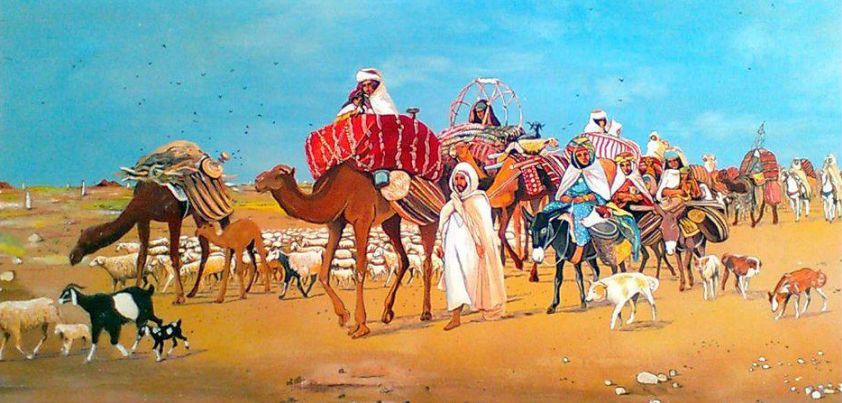 The central theme of this story from Sue Alexander is dealing with grief and loss. When a Bedouin boy is lost in the desert, his shattered father (a tribal sheik) decrees that none of his people speak the boy’s name. Nadia, his willful daughter, finds that the only way she can cope with her brother’s loss is to talk about their happy times together. When others follow her example, the sheik reacts angrily. However he, too, soon learns that rather than blocking out the memory, the best way process the death of a loved one is to celebrate their life. More…
The central theme of this story from Sue Alexander is dealing with grief and loss. When a Bedouin boy is lost in the desert, his shattered father (a tribal sheik) decrees that none of his people speak the boy’s name. Nadia, his willful daughter, finds that the only way she can cope with her brother’s loss is to talk about their happy times together. When others follow her example, the sheik reacts angrily. However he, too, soon learns that rather than blocking out the memory, the best way process the death of a loved one is to celebrate their life. More…
The All-American Slurp
 The major themes of this story by Lensey Namioka are: 1) the innate desire of most people (especially the young) to “fit in” with the community in which they find themselves; and 2) the need to understand and accept cultural differences when they appear. Said to be based on real experiences from the author’s early life in America, the story makes these points in a light-hearted way. Its main message is expressed cryptically in the very last line: All Americans slurp. This suggests that if we put aside cultural differences, we are all the same inside. More…
The major themes of this story by Lensey Namioka are: 1) the innate desire of most people (especially the young) to “fit in” with the community in which they find themselves; and 2) the need to understand and accept cultural differences when they appear. Said to be based on real experiences from the author’s early life in America, the story makes these points in a light-hearted way. Its main message is expressed cryptically in the very last line: All Americans slurp. This suggests that if we put aside cultural differences, we are all the same inside. More…
The Little Match Seller
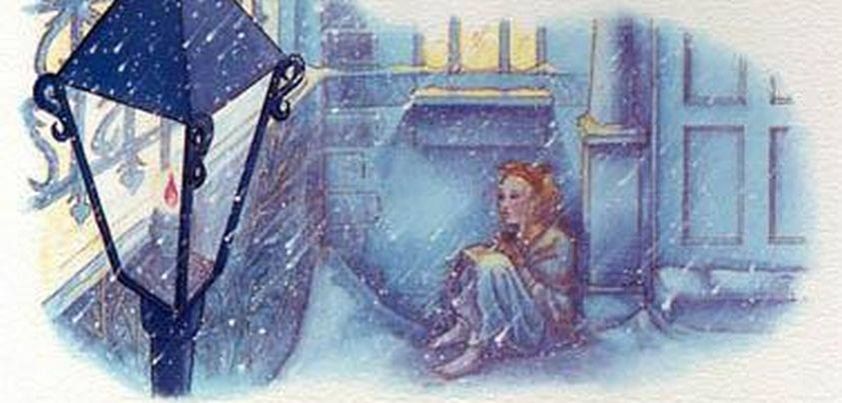 This well-known story by Hans Christian Andersen is one of the saddest Festive Season tales ever told. A cruel father sends his little girl out into the snow to sell matches. She crouches between two buildings, afraid to go home because she hasn’t made any sales. As she imagines the people inside their warm houses getting ready for a big New Year’s dinner, a vision of her beloved grandmother appears to take her to a better place. Themes include loneliness, poverty, cruelty, exploitation, indifference to suffering, hope, the power of fantasy, Christianity and life after death. More…
This well-known story by Hans Christian Andersen is one of the saddest Festive Season tales ever told. A cruel father sends his little girl out into the snow to sell matches. She crouches between two buildings, afraid to go home because she hasn’t made any sales. As she imagines the people inside their warm houses getting ready for a big New Year’s dinner, a vision of her beloved grandmother appears to take her to a better place. Themes include loneliness, poverty, cruelty, exploitation, indifference to suffering, hope, the power of fantasy, Christianity and life after death. More…
The School Play
 This Gary Soto story is about facing fear. The protagonist is scared of forgetting his only line in his sixth-grade play. In addition to worrying about being laughed at, another student has threatened to “bury his face in the ground” if he messes up. The play is about the infamous Donner Party. The fear theme is supported in its concluding words: You gotta suck it up (endure hardship) in bad times. Interestingly, although intended to suggest that the starving travelers should have been stronger in resisting cannibalism, this expression could also be used to justify eating dead bodies to survive? More…
This Gary Soto story is about facing fear. The protagonist is scared of forgetting his only line in his sixth-grade play. In addition to worrying about being laughed at, another student has threatened to “bury his face in the ground” if he messes up. The play is about the infamous Donner Party. The fear theme is supported in its concluding words: You gotta suck it up (endure hardship) in bad times. Interestingly, although intended to suggest that the starving travelers should have been stronger in resisting cannibalism, this expression could also be used to justify eating dead bodies to survive? More…